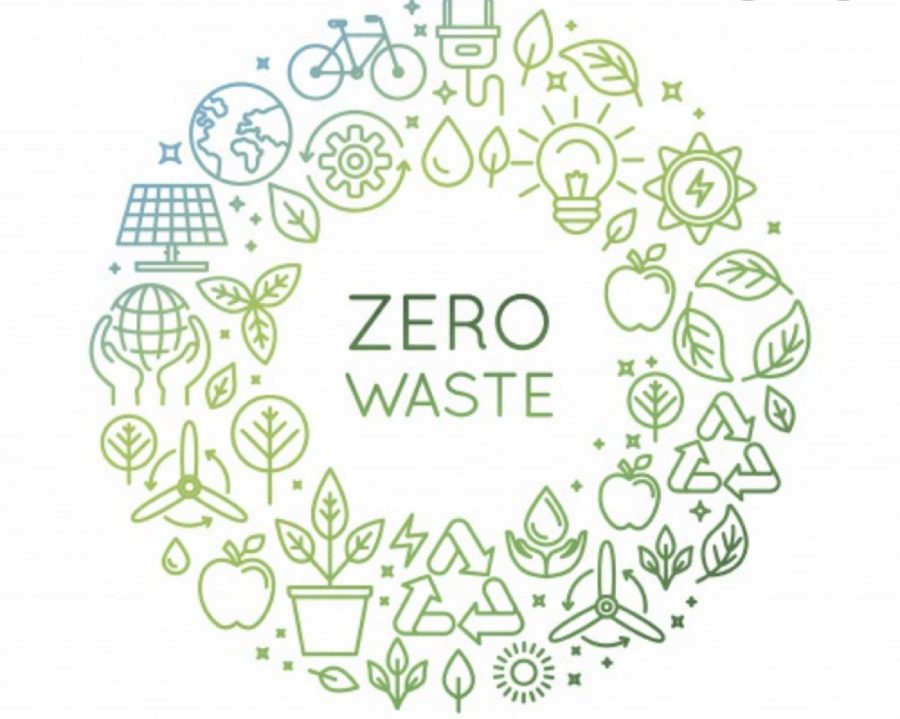A Zero Waste Life style
December 16, 2019
Did you know that brewing a cup of coffee, eating a healthy diet, or going to work each day can produce so much waste? In fact, the average American produces 5.91 pounds of trash per day.
The goal of a Zero Waste lifestyle is to produce as little trash as possible. Some ways individuals living this way reduce their trash is by: composting, cutting out plastic and single use products like ziplock bags, coffee filters, and grocery bags.
The act of grocery shopping (which everyone does weekly) is littered with opportunities to buy items that have single use packaging. Consider the fruit people buy pre-chopped in a styrofoam and plastic container. Or have you noticed how many different kinds of snack foods such as chips come in plastic bags?
Cutting down on purchasing items can be easy in some ways and more challenging in others. For example, buy the whole pineapple and cut it up yourself. No plastic packaging to discard.
On the other hand, some items are more difficult to purchase without having glass bottles or cardboard boxes to deal with.
A Zero waste person brings mason jars and fills them up with pasta, beans, oil and more. They record the weight of the jar so that they do not get charged for the weight of the jar and then they weigh the food.
Not many stores have that system in place, though. There are many ways for you to reduce waste in a grocery experience, though. An easy solution is to bring your own bags to put your groceries in. You can also look for products that contain the least amount of plastic or are made from recycled materials, and for deli meats and cheeses you can bring beeswax wraps and ask them to wrap your produce for you.
As for coffee and lunches for work, bring your own lunch in reusable containers and a lunch bag to use everyday. Can’t start your morning without that cup of coffee? Perhaps reconsider that Keurig. Each little cup of coffee is a plastic container thrown away. Buy a reusable “k-cup” and fill it yourself.
Or, Starbucks and other places that sell coffee often give you a discount if you bring your own cup (that they sell initially) to refill instead of using cup after cup. According to Green Motion, Nearly 25 billion coffee cups are thrown away each year; that is roughly 74 million daily.
Another easy trend to adopt in the Zero Waste lifestyle is to stop using plastic straws. At a restaurant, either don’t use one or bring your own reusable one. These are easy to purchase, and come with a tool to clean out the straw with ease. Most cost less than $10 for a pack of four or more.
Straws may seem like such an insignificant piece of garbage, but according to National Geographic, around 500 million straws are used each day. They state that 8 million tons of plastic flow into the ocean each year, and though straws make up .025% of that, it is one easy way to reduce that number.
Many states and major cities are making plastic straws illegal, such as California and Seattle–the largest city to ban them. Additionally, companies are phasing out straws, such as Starbucks and McDonalds.
Zero Waste lifestylers have implemented change in their shopping, eating, and even bathroom habits. A Zero-Waste bathroom cuts out bottles and disposable razors. Instead, they make use of bars of shampoo and conditioner and metal razors where the blade is replaceable.
For toothbrushes there’s bamboo with plant based bristles, and people can either make their own toothpaste with baking soda and peppermint oil or use toothpaste bites.
As for kitchens, it’s easy to cut out paper towels and use rags or cut up shirts. Upcycle jars, bowls, and plates. No need to buy plastic to-go containers, try using a mason jar to store that extra soup.
Zero waste is beneficial to the planet; it’s a great way to make an overall cleaner planet, but it’s a dedicated individual who can adopt full-fledged practices. These individuals can accumulate no more than a mason-jar full of trash in a couple months time.
While not everyone can be as fully pledged to this lifestyle, there are many small changes one can make to reduce their trash output. Try and adopt two this week, and maybe two the next week. Once you stop using paper towels, you’re not going to miss them!


